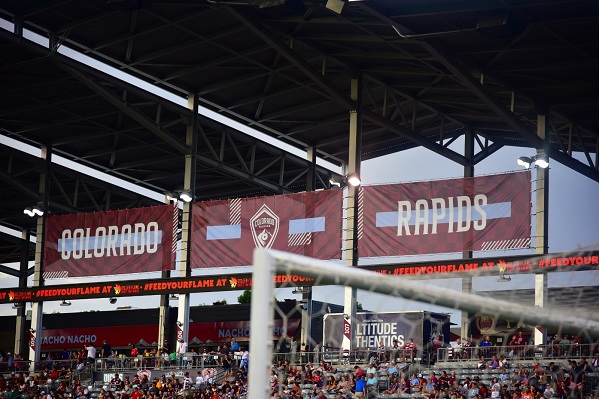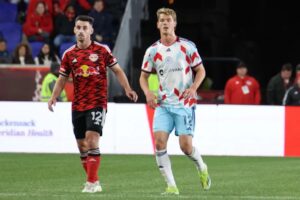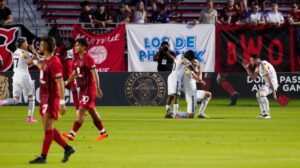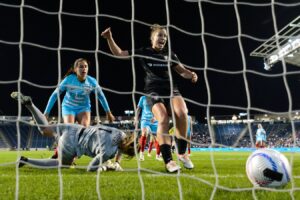COMMERCE CITY, Colo. – Brian Reed has finished his first season as the Player Welfare Office at Colorado Rapids. With COVID-19 lessons learned, the Rapids and its Development Academy are taking player wellbeing on and off the pitch more seriously. In a brand new position, Reed is creating the change he wishes to see.
How Player Welfare Officer Brian Reed Is Helping Colorado Rapids on and off the Pitch
First off, what is a Player Welfare Office. “Simply put, a life coach,” Reed answered.
“I get to work with all three levels. I work with the academy, I work with Rapids 2, and I work with the first team. Each of those groups, they’re in different phases of their life, so they require different things. On any given day, I might be giving basic time management skills to an Academy player. I might be working with players either on the college placement process or potentially helping them because they just moved into their first apartment on their own. And then with a first team player, I might be helping them secure a child daycare situation because this is their first child. I really enjoy the way the role has been set up by the club,” he told Last Word.
“We forget what happens outside of the white light. I’ve always been one to want to go above and beyond for any of the players that I’ve ever worked with in this type of role. I would argue it’s necessary. Around the world, big clubs, small clubs, they’re really putting a priority on player welfare, player care. I love seeing players have success, and the only way they’re going to have success is if everything else is going well for them. You can’t compartmentalize and play at your absolute peak if other things aren’t settled in your life. You might be able to do it for a short amount of time. We want to be here to help every one of our players have that success, both on the field and off the field.”
Reed went on to say that no two days during the season are the same. He checks in daily with players from the youngest academy team to the first team. This includes academic support for players still in school to onboarding a new MLS signing who needs to get settled in Denver. International players may need help to find place to live, a drivers license, a phone, a Social Security number, furniture, enrolling their kids in school, learning English, and finding a grocery store or restaurant with familiar ethnic food. Brian tried to get that settled within 14 days of arrival. For SuperDraft picks, he helps those players adjust to a professional environment.
In their first year with the club, Reed spent time regularly with Max Alves and Anthony Markanich.
“I like to joke that you could you could write a 30 minute sitcom off of Brian and Max go to Whole Foods. We’re going to make sure they’re not ordering DoorDash every single day.”
He comes to the Rapids with a wealth of experience with youth and college age players. At the MLS level, he spent a year doing video and performance work with the LA Galaxy and as a coach with the Houston Dynamo academy. With his role now as Player Welfare Manager, he jokes that he’s getting a Ph.D. in soccer.
Reed was brought to help improve the wellness experience, especially for youth players. The COVID-19 pandemic had a massive impact on young people. Many lessons were learned that the club is now implementing.
“If you had a player who at home speaks a language other than English during the pandemic, during the pandemic, they spent anywhere from 12 months to 18 months at home outside of the classroom environment, away from their peers. You’re going back to 100% hearing the native language and potentially, depending on how the online education was broken down, that exposure to English every day drops off.”
“Getting transcripts, that was one of the first things I do with the Academy. You request the transcripts because you want to see where everybody’s at academically. Once they went back to the classroom, you had students that were still there, were good in math, they were still good at math because math is, quite honestly, its own language. But then when you look at how they were performing in some of the other subjects that potentially have lessons that are based on English, they’re struggling. The pandemic saw some of the resources in some of the schools lose councilors, lose teachers. All of a sudden these kids are falling behind, no fault of their own.”
The club generally saw grades go down during 2020 and online learning. Reed and Academy Director Chris Cartlidge are turning to Audi Goals Drive Progress and other resources to better support the academy’s future.
“Chris has been working to continue to build and grow our Audi online school program. Each year, we’ve added more players. We’re up to 15 players who are full time in our online school program. Some of those players needed more support than others, but I think he’s done a really good job of going through case by case basis and trying to figure out which players we really need to come into the environment so that we can help them thrive and succeed. We want to continue to grow that program because we want to continue to provide the extra resources and the care.”
The club has also come out of the pandemic with better mental health and social resources. Reed has spearheaded the club’s home stay program, which sets up players from outside Colorado with host families.
“The idea is to have a young player come in who’s leaving their family that wants to compete in a very high pressure environment. We want them to feel that family presence. They come into our environment, they’ve left home. But then you provide them with that structure, that family environment, that family feel. So whether it’s families that are directly involved with the academy, some families that have had players come through, and have graduated but are still looking to be involved.”
“You add the layer of of being away from your family and potentially missing siblings, mom, dad. The homestay model and having that host family is something that can really help these kids find their footing, thrive and ultimately push their development and find real success. There’s so many great families right around Dick’s Sporting Goods Park. It’s pretty amazing. It does help the players ultimately find their footing.”
Colorado Rapids Player Welfare Officer Brian Reed was interviewed for the podcast Holding The High Line back in July. His work will continue into his second year with the club in 2023.
Photo Credit: John A. Babiak @Photog_JohnB






